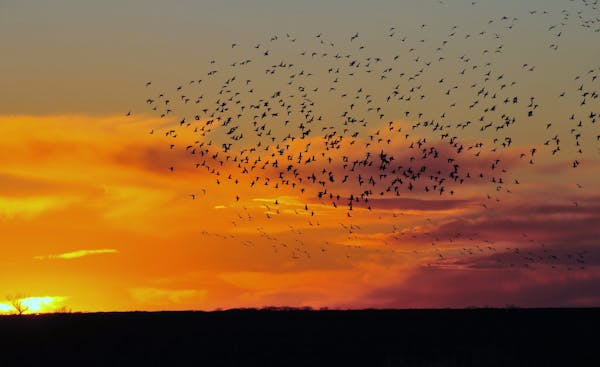A week ago, on the eve of the waterfowl opener, I wrote a column saying, in part, that the duck season was opening too early and that the limits were too high.
But the column's broader point, perhaps too broadly made, was twofold, specifically:
• By not educating the state's waterfowlers more fully and publicly about the many problems facing the state's ducks, and enjoining them in the fight to conserve these birds, and instead pandering (my word) to them with an early opener and higher limits, particularly for wood ducks and hen mallards, Department of Natural Resources Commissioner Tom Landwehr and Deputy Commissioner Dave Schad — ardent waterfowlers both — were doing both ducks and duck hunters a disservice.
• This disservice is compounded, I said, "especially now, during the greatest U.S. farmland conversion since the tractor replaced the horse" when the commissioner and assistant commissioner don't "stand tall and very publicly against the onslaught of degradation that has overwhelmed Minnesota wetlands and wetland wildlife, not least ducks."
Some thoughts:
Regardless whether a given waterfowler believes the early opener and higher limits will lower the state's breeding populations of wood ducks, teal and mallards over time (I believe they will; others argue they won't), virtually no one in the state sees a bright future for ducks, at least not in the near and intermediate terms, given habitat losses, the rampant use of pesticides and other farmland chemicals, and the effects of urban sprawl and other development.
A lot of habitat work is being accomplished in the state by the DNR, the U.S. Fish and Wildlife Service, and Ducks Unlimited, etc., thanks largely to passage of the Legacy Act in 2008 and establishment of the Wildlife Heritage Fund.
But few expect this work, important as it is, will counterbalance entirely the habitat losses and degradation the state has experienced, and will continue to experience.
This seems especially true given the dim prospect of passage anytime soon of a federal farm bill that reasonably balances production with conservation.
So more must be done. In my view, the state's top conservation professionals, e.g., Landwehr and Schad, among others, should lead the way. Not only by properly establishing a public agency's habitat, spending and other priorities, but by rallying the troops and the public at large by laying out exactly and very visibly the source of threats to ducks and other aquatic resources, and what must be done to combat these concerns.
Which of course isn't occurring in Minnesota (or other states, or in Washington). Nor has it for many years.
The reason, simply, is "politics," which manifests itself not only as influence leveraged disproportionately on policymakers (such as DNR commissioners), the Legislature and Congress by developers and, particularly, the farm lobby, but as split allegiances among even the most serious waterfowlers (and other sporting types).
This last bunch, for example, might love to hunt ducks or use other natural resources, but nonetheless, in a voting booth, often considers a candidate's fiscal policy or religion or political philosophy (or whatever) ahead of his or her conservation record.
False beliefs, willingly formed, often justify these votes, e.g., that "things aren't as bad as they seem" or "the threat is overblown by the media."
Handmaidens to this dysfunction have been three key groups: political leaders (presidents and governors) who lack information, political will, courage or all three; top resource professionals who work for these leaders, who have the information, but fear for their jobs or careers or are risk-averse; and the press, including in some cases outdoors writers, some of whom are happy enough to shoot what they can while not straying too far off the establishment reservation, for fear of ridicule and disenfranchisement.
Years ago, the cost to society of this conspiracy of silence was relatively minimal, because resources were plentiful and threats to them fewer.
Today, we enjoy no such latitude.
Leaders, for example, who are mute on climate change and its potential consequences might as well be deniers of it, because the effect is the same: No progress.
Similarly are those who are silent on the threat to ducks and their aquatic and grassland habitats.
Leaders who don't use their offices as bully pulpits to educate waterfowlers — and the citizenry at large — about the seriousness of the issue, and about possible solutions, are in their own way accelerating the demise of these resources.
Welcome to Minnesota, circa 2013.
Dennis Anderson • danderson@startribune.com

Anderson: Celebrate Earth Day by rekindling real connection to nature
Anderson: Anglers protesting tough new Mille Lacs rules are wrong

Anderson: Courts, not politicians, should rule on Red Lake, White Earth lands

Anderson: Multimillion windfall gets invasive carp deterrent moving
![A young whitetail deer searches for food as another blanket of snow coats the arrowhead. ] Minnesota -State of Wonders, Arrowhead in Winter BRIAN PETE](https://arc.stimg.co/startribunemedia/WK32UWWY6FKNWJUIYCJ6ZPT4AU.jpg?h=91&w=145&fit=crop&bg=999&crop=faces)

